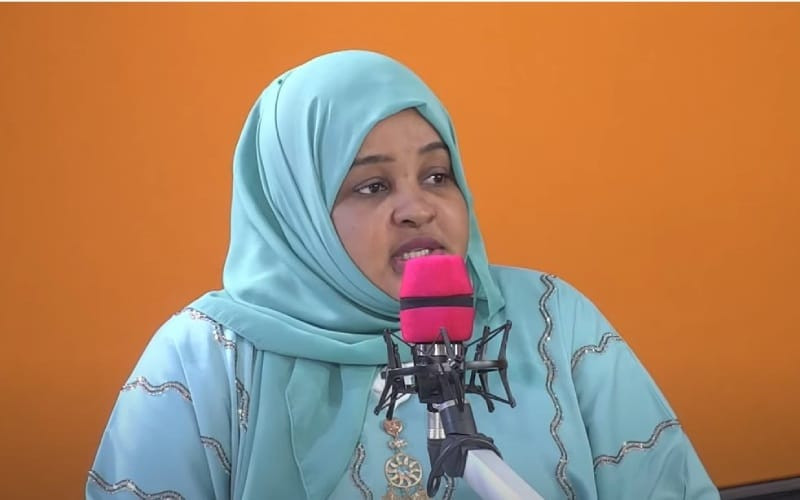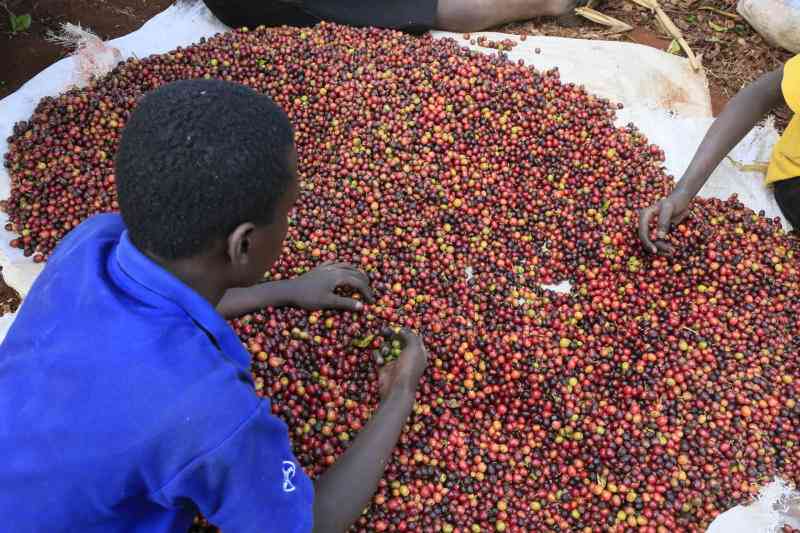 |
|
Nyevu Charo, mother to two deformed children, has lost two pregnancies to what she claims were the effects of hyper-saline water. [PHOTO: COURTESY] |
By DANN OKOTH
KENYA: There is a familiar tide that sweeps into the salt-mining fields of Magarini constituency in Kilifi County every day in — and it has dangerous undercurrents.
Hundreds of men and women working in the salt mines without protective clothing is a common sight. Yet experts say exposure to the hyper-saline water increases the chances of spontaneous abortion in pregnant women, who are the majority salt workers.
The attendant wanton environmental degradation resulting from releasing hyper-saline water into the surrounding environment not only threatens entire ecosystems — but also puts hundreds of livelihoods at risk.
From a distance, shadowy images moving laboriously like a clutch of freshly hatched turtles, dot the shiny vast crystalline expanse. Move closer and the sea of scantily dressed humanity squirming under the burden of hard labour comes into view.
Many of the labourers have covered their feet and hands with old rags and polythene bags to make up for the missing protective gear.
Often, these scenes pass as a legitimate means to earn an honest living but there are deep seated environmental and health consequences for the salt labourers.
The work itself is backbreaking. Each worker needs to shovel in at least 50 wheelbarrows per day in order to earn a meagre Sh200.
It involves wading through the salty waters from 6am to 7pm and breaking hard salt panes. This takes a huge toll, especially on pregnant women.
Beyond the façade of an idyllic co-existence presented by the gentle drone of the ocean in the distance, interspersed by the rhythmic strike of hoes on the ground, an unseen danger lurks in the background.
Deformed children
Gongoni village sits some 40 kilometres east of Malindi town, but apart from the grinding poverty, this hamlet, and the surrounding villages, have a strikingly common and horrifying characteristic —women who inordinately suffer spontaneous abortions or give birth to deformed children.
Nyevu Charo gave birth to two deformed children while working in the salt mines for Krystaline Salt Company and lost two pregnancies due to the effects of hyper-saline water, she claims.
“It was strange because I gave birth to perfectly normal children whenever I stopped working in the salt mines,” she says.
The daughters, Rebecca and Rehema Charo, are also mentally challenged and can only attend a school for children with special needs.
Stay informed. Subscribe to our newsletter
“Other children tease them over their physical condition and this has affected them psychologically. I had hoped the company and other well-wishers would come to my aid after The Standard first highlighted my plight, but nothing has been forthcoming,” she says.
Charo has since stopped working at the salt mines after doctors told her the salt could be responsible for her reproductive health problems.
But she would not be alone in what has now degenerated into a common malignant curse among women associated with the mines.
Miriam Mohammed Abdalla has worked the salt mines for 10-years and has suffered abortions three times in six-years.
“I also suffer strange skin lesions, which doctors cannot pin to a particular cause,” she told us when we caught up with her at Kurawa salt mines in Kanagoni village in Marereni sub-location.
Her counterpart Josephine Ngombo has lost two pregnancies in the last year alone while engaging as a casual labourer for Krystaline Salt Company.
“My first child was born four months before term and the second I lost three months after conception. Both incidences happened last year,” she says.
Statistics from Marereni Dispensary, the only health facility in the area, show that Kanagoni village alone records three stillbirths every month.
“But these are just the cases that arrive at the dispensary. There could be many more because most women visit traditional birth attendants as opposed to coming to hospital,” says a senior nurse at the dispensary.
Strenuous activities
“I would not say the salt is responsible but we try to advise women who visit our clinic to avoid strenuous activities during their pregnancy,” says the nurse who cannot be named because she is not authorised to speak for the institution.
Yet circumstances have conspired against the women to ensure they remain in the salt mines as a means of putting food on the table and sending their children to school.
“There are few opportunities here and we are forced to work in the mines despite the hard work and hazardous conditions,” Abdallah says.
Malindi District is one of the poorest districts in Kenya, according to the latest Economic Survey, with a poverty index of 76 per cent.
About 243,556 people in the district are classified as poor out of a population of 544, 303 — which is ironical because Malindi is one of Kenya’s main tourism hubs.
According to the World Health Organisation (WHO), the poorest countries have the highest incidents of stillbirths (miscarriages) with both Sub-Saharan Africa and South Asia accounting for nearly 70 per cent of worldwide stillbirths.
Limited health services, WHO says, constitute the major determinant in perinatal mortality, adding that there was growing concern that the high rate of stillbirths in many regions are also being driven by less apparent, potentially preventable factors.
A 2010 study by the US-based Environment Law Alliance Worldwide (ELAW) says pregnant women are at risk when exposed to contaminants like arsenic, fluoride, nitrates and nitrites, compounds commonly found in hyper-saline water.
The US study suggests that it is possible that the evaporation of sea salt in ponds in Magarini, Malindi, is exposing pregnant women to significant quantities of these contaminants.
Toxic contaminants
“The fact the hyper-saline water from the salt pans could be seeping into fresh water sources in Magarini further expose the residents to the toxic contaminants,” says Dr Mark Chernaik who authored the study.
However Koigi Kamau, an Associate Professor of Obstetrics and Gynaecology at the University of Nairobi, says if women in the affected areas are suffering a higher incidence of miscarriages, then there may be a simpler explanation for this outcome.
Maintaining a healthy pregnancy requires access to clean water, Kamau says.
Also, he says, if women in a community have the primary responsibility of fetching clean water, then water scarcity during pregnancy would cause women to expend more energy to fetch the commodity, diverting energy needed for foetal development.
So, he says, if salt processing plants are causing a loss of freshwater sources contributing to serious chronic water scarcity, then this alone might cause higher incidence of miscarriage among the general population.
“If the miscarriages are a result of direct contact with hyper-saline water, then the problem needs to be very well documented — but so far I doubt that has not happened,” he says.
An earlier study by the Institute of Law and Environmental Governance (ILEG) found that those who work in the salt mines complain that their health has been negatively affected.
It identifies skin rashes, sores as well as development of abdominal growths as common maladies afflicting the workers.
“Chemicals used in the factory to process salt seem to have an abortifacient effect (induced abortion) since women who work there during their first trimester of pregnancy often miscarry,” the report noted.
Despite a government Environmental Impact Assessment report that highlighted the environmental consequences of salt-mining in Malindi County years back, investors have not complied with the environmental safety standards recommended in the report.
This has not only had a negative impact on the environment leading to the decimation of huge swathes of mangrove forest, but has also has exposed the poorly paid salt workers in the mines to serious health risks.
 The Standard Group Plc is a
multi-media organization with investments in media platforms spanning newspaper
print operations, television, radio broadcasting, digital and online services. The
Standard Group is recognized as a leading multi-media house in Kenya with a key
influence in matters of national and international interest.
The Standard Group Plc is a
multi-media organization with investments in media platforms spanning newspaper
print operations, television, radio broadcasting, digital and online services. The
Standard Group is recognized as a leading multi-media house in Kenya with a key
influence in matters of national and international interest.
 The Standard Group Plc is a
multi-media organization with investments in media platforms spanning newspaper
print operations, television, radio broadcasting, digital and online services. The
Standard Group is recognized as a leading multi-media house in Kenya with a key
influence in matters of national and international interest.
The Standard Group Plc is a
multi-media organization with investments in media platforms spanning newspaper
print operations, television, radio broadcasting, digital and online services. The
Standard Group is recognized as a leading multi-media house in Kenya with a key
influence in matters of national and international interest.









